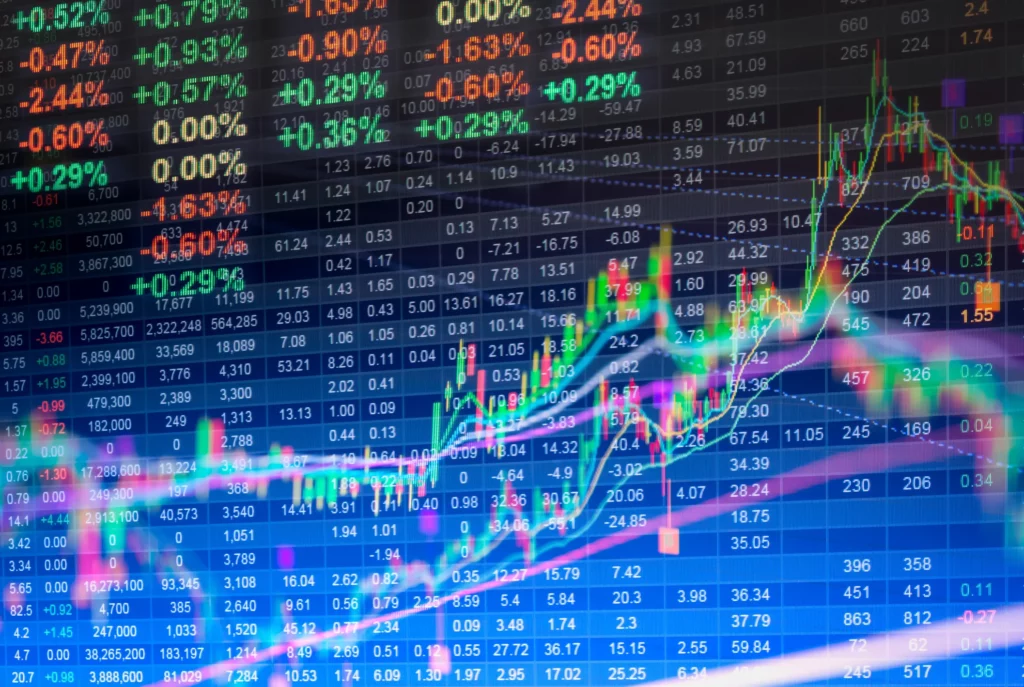
Stock exchanges are venues where buyers and sellers meet to exchange ownership of shares in publicly traded corporations. Stocks are traded on these exchanges. This is the general workflow for stock trading:
- Stock Exchange: Trading takes place on stock exchanges all over the world, including the London Stock Exchange (LSE), NASDAQ, and New York Stock Exchange (NYSE). These exchanges offer a controlled and well-organized stock market for purchases and sales.
- Listed Companies: Businesses might decide to go public by issuing shares in order to raise funds from the general public. Following its listing on a stock market, investors will be able to purchase and sell these shares.
- Market Participants: In the world of stock trading, there are primarily two kinds of market participants: Individuals, institutional investors, and traders that wish to buy shares are buyers (bulls).
Bears: Investors who want to sell their current shares are known as sellers.
- Accounts for stock brokerages: To trade equities, investors require a brokerage account. Brokerage businesses serve as a middleman between stock exchanges and investors. Investors use these accounts to place orders for equities to be bought and sold.
- Ordering: Various kinds of orders can be placed by investors, such as: Market orders: These are requests to purchase or sell stocks at the going rate in the market.Limit orders are placed to purchase or sell stocks at a predetermined price or above.Stop orders: An order that, upon the stock reaching a certain price (the stop price), turns into a market order.Stop-Limit Orders: These work similarly to stop orders but, upon reaching the stop price, they become limit orders.
- Order Execution: An order is transmitted to the exchange for execution as soon as it is placed. A trade takes place when a seller’s ask, or offer, and a buyer’s bid match. All transactions are made sure to be transparent and fair by the stock exchange.
- Market makers and liquidity: Market makers are organisations that enable trading by continuously offering quotes for buying and selling stocks. They facilitate speedy order execution for traders by assisting in the preservation of market liquidity.
- Bid and Ask Prices: The bid price is the greatest amount a buyer is willing to pay for a stock, while the ask price is the lowest amount a seller is ready to take. The bid-ask spread is the name given to the disparity between these prices.
- Trading Hours: Orders can be placed and carried out during specified trading hours on stock exchanges. The hours differ according on the region and exchange.
- Settlement: The procedure that follows the execution of a trade is known as settlement. The ownership of the shares is transferred to the buyer and money is transferred from the buyer’s brokerage to the seller’s brokerage. Although it can change, the settlement process typically lasts a few business days.
- Statements and Confirmation: Trade confirmations outlining the completed deals are sent to investors. Account balances, holdings, and transactions are displayed on regular account statements.
- Market Indices: Stock indices, such as the Dow Jones Industrial Average and the S&P 500, monitor the performance of a particular group of stocks. They offer perceptions into the general tendencies of the market.
- Settlement: The procedure that follows the execution of a trade is known as settlement. The ownership of the shares is transferred to the buyer and money is transferred from the buyer’s brokerage to the seller’s brokerage. Although it can change, the settlement process typically lasts a few business days.
- Statements and Confirmation: Trade confirmations outlining the completed deals are sent to investors. Account balances, holdings, and transactions are displayed on regular account statements.
- Market Indices: Stock indices, such as the Dow Jones Industrial Average and the S&P 500, monitor the performance of a particular group of stocks. They offer perceptions into the general tendencies of the market.
- Regulation and Supervision: In order to guarantee honest and open trade, stock exchanges are subject to regulations. In order to preserve investor protection and market integrity, regulatory organisations keep an eye on exchanges.
Keep in mind that there are risks associated with stock trading, so before you start trading, make sure you have a solid grasp of the market, trading tactics, and risk management.
FOR MORE INFO CLICK THIS SITE:https://learningsharks.in/
FOLLOW OUR PAGE:https://www.instagram.com/learningsharks/?hl=en
